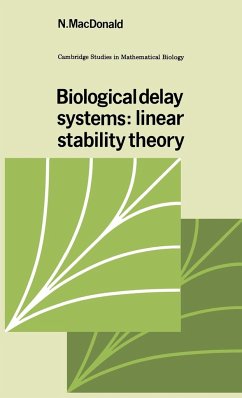In studying the dynamics of populations, whether of animals, plants or cells, it is crucial to allow for intrinsic delays, due to such things as gestation, maturation or transport. This book is concerned with one of the fundamental questions in the analysis of the effect of delays, namely determining whether they effect the stability of steady states. The analysis is presented for one or two such delays treated both as discrete, where an event which occurred at a precise time in the past has an effect now, and distributed, where the delay is averaged over the population's history. Both of these types occur in biological contexts. The method used to tackle these questions is linear stability analysis which leads to an understanding of the local stability. By avoiding global questions, the author has kept the mathematical prerequisites to a minimum, essentially advanced calculus and ordinary differential equations. Much of the material is based on recent research and appears here for the first time in book form. Yet the work not only is a synthesis of this research but also an exposition suited for courses; exercises are provided at the end of each chapter. Thus it will be appreciated by graduate students and research workers in mathematical biology, control theory and population dynamics.
Table of contents:
Preface; 1. How delays arise and what effects they have; 2. Ordinary differential equations: the polynomial characteristic equation; 3. Functional differential equations: the transcendental characteristic equation; 4. Hurwitz polynomials; 5. First- and second-order systems with a discrete delay; 6. Higher-order systems, and systems with two delays; 7. Reducing a discrete delay problem to one with a polynomial characteristic equation; 8. Stability independent of delay; 9. Distributed delay; 10. Reducible delays and linear subsystems; Appendices; Solutions to exercises.
In studying the dynamics of populations, whether of animals, plants or cells, it is crucial to allow for delays such as those due to gestation, maturation or transport. This book deals with a fundamental question in the analysis of the effects of delays, namely whether they affect the stability of steady states.
Hinweis: Dieser Artikel kann nur an eine deutsche Lieferadresse ausgeliefert werden.
Table of contents:
Preface; 1. How delays arise and what effects they have; 2. Ordinary differential equations: the polynomial characteristic equation; 3. Functional differential equations: the transcendental characteristic equation; 4. Hurwitz polynomials; 5. First- and second-order systems with a discrete delay; 6. Higher-order systems, and systems with two delays; 7. Reducing a discrete delay problem to one with a polynomial characteristic equation; 8. Stability independent of delay; 9. Distributed delay; 10. Reducible delays and linear subsystems; Appendices; Solutions to exercises.
In studying the dynamics of populations, whether of animals, plants or cells, it is crucial to allow for delays such as those due to gestation, maturation or transport. This book deals with a fundamental question in the analysis of the effects of delays, namely whether they affect the stability of steady states.
Hinweis: Dieser Artikel kann nur an eine deutsche Lieferadresse ausgeliefert werden.








